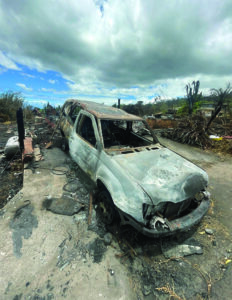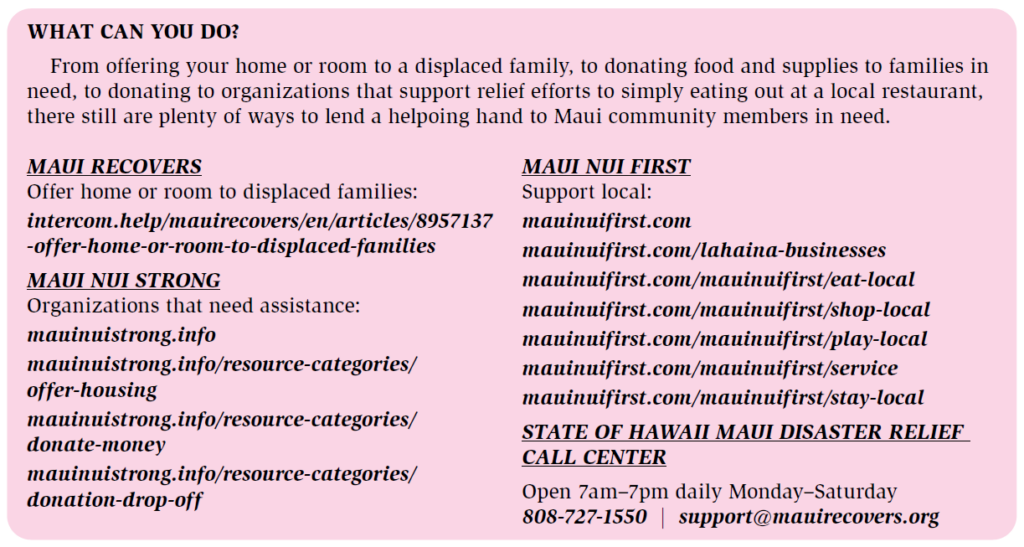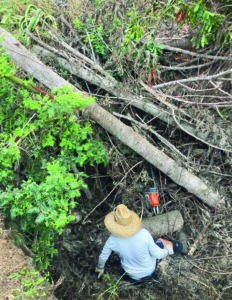 It has been nearly a year since wildfires fueled by powerful winds from Hurricane Dora destroyed the town of Lahaina and parts of Kula. The wildfire that killed at least 101 people is the deadliest in the US in more than a century, and the most lethal natural disaster to occur in Hawai‘i since statehood in 1959.
It has been nearly a year since wildfires fueled by powerful winds from Hurricane Dora destroyed the town of Lahaina and parts of Kula. The wildfire that killed at least 101 people is the deadliest in the US in more than a century, and the most lethal natural disaster to occur in Hawai‘i since statehood in 1959.
The Lahaina fire has caused extensive damage and significant financial losses. The fire affected 2,719 structures in the area—86% of them residential, leaving thousands displaced. The estimated cost to rebuild Lahaina is $5.52 billion.
It makes sense that studies, assessments, evaluations, action plans, advisory committees, and planning boards mindful of history and culture will all be required to tackle the complex, monumental task of reconstructing an entire town.
But what can one person do that would have a positive impact in the aftermath of such devastation? Plenty. There are still many opportunities to lend a hand or open your pocketbook to those in need and help with the expiation of this disaster and the mitigation of future occurrences.
 Mālama Kula
Mālama Kula
In Kula, Kyle Ellison, who nearly lost his own home to the Upcountry fire, has emerged as a changemaker in his community. A big eucalyptus tree was blown down and fell on some power lines, which started a fire in the gulch near his home. While much of the focus has understandably been on Lahaina, sparks from the August fires were still flaring in Kula months later. Despite his own plight, or maybe because of it, he continues his battle on the front lines.
Kyle founded Mālama Kula, an action-oriented, results-driven nonprofit organization, in order to provide disaster relief in response to the Kula fire, but he also aims to address many other challenges facing his community.
Based in Kula, Mālama Kula helps provide programs, funding and services for community cleanup, and disaster relief and mitigation.
“From day one of the Kula fire, our team had boots on the ground and rallied to help serve our neighbors,” says Kyle. “People donated whatever they had and rose up to help at a time when the community needed them most. During the Kula fire, we all became firefighters.”
Twenty Kula homes were lost, Kyle says. In the days that followed, Kula residents rallied and gathered by the hundreds, helping to save properties and homes, and coming to the aid of neighbors, family and strangers dealing with what was left… and what was lost.
 “The Kula community is not going to wait until the next time we hear the crackling of burning trees 200 yards behind our houses to suddenly start thinking it’s time to do something,” says Kyle. “We need to make the changes now and take action to prevent what is threatening us. That is my mission and commitment. We’re not going to wait around for studies or a grant or the government. Instead, we will get up, put our boots on and go out and fix the problem ourselves. That has really been the silver lining in all of this—that the community has really banded together to fix our own problems and take care of ourselves.”
“The Kula community is not going to wait until the next time we hear the crackling of burning trees 200 yards behind our houses to suddenly start thinking it’s time to do something,” says Kyle. “We need to make the changes now and take action to prevent what is threatening us. That is my mission and commitment. We’re not going to wait around for studies or a grant or the government. Instead, we will get up, put our boots on and go out and fix the problem ourselves. That has really been the silver lining in all of this—that the community has really banded together to fix our own problems and take care of ourselves.”
Thanks to the ensuing Kona storms, the fires were finally doused, but the heavy rains brought their own set of problems. Without proper vegetation and watersheds, the rains caused landslides, rockslides and erosion hazards, with debris-tainted runoff flowing into gulches and eventually into the ocean via Kealia Pond and Ma‘alaea Bay.
“We are scattering wood chips from the downed trees on the burn zones to mitigate erosion and help the soil retain moisture,” says Kyle. “We also are working with the Kula Community Watershed Alliance to replant with native vegetation before invasive species can reestablish themselves. We’re turning back the hands of time by planting things that will create a thriving native watershed and keep moisture in the ground.”
They are also working to establish an Upcountry green waste facility, clearing fire fuel from gulches and pushing for better infrastructure.
Kyle has created tools, solutions and a structure for success. So roll up your sleeves and get out your wallet—there is still much we all can do.
“Show up with a chainsaw or your checkbook. Either means we are going to get work done.” Get updates on workdays via email or Instagram.
MĀLAMA KULA (nonprofit)
A program of Ka ‘Ike Mau Loa O Ke Kai Hohonu
PO Box 1134, Kula, HI 96790
MalamaKula.org | malamakula@gmail.com
instagram.com/malamakula


Leave a Reply